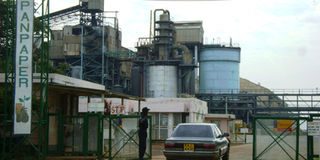Minister promises to revive Pan Paper

Pan African Paper Mills in Webuye Town. Industrialisation Cabinet Secretary Adan Mohammed has said
the government estimates Pan African Paper Mills will require an investment of Sh1bn.
PHOTO/FILE
What you need to know:
- The reopening of the factory could translate into 1,500 jobs for former workers and thousands more indirect jobs.
- The Biggest challenge had been paying off long-term lenders to leave and allow private investors to take over.
Private investors will help in the revival of Webuye Pan Paper Mills.
Negotiations with two investors to take over the running of the mills are almost complete, according to Industrialisation Cabinet Secretary Adan Mohammed.
“The President and his Deputy are very concerned and want to see Pan Paper brought back to life,” Mr Mohammed said yesterday during a courtesy call on Bungoma Governor Kenneth Lusaka.
The paper factory, which went into receivership in 2009, requires a substantial capital investment to revive its fortunes and breathe new life into Webuye town.
The government had narrowed down the search to two investors, out of the six who had expressed interest after bids were invited from local and foreign companies, the Cabinet Secretary said.
The company’s revival will translate into jobs for more than 1,500 of its former workers and thousands more indirect jobs.
The government’s efforts to revive the factory had failed after several false starts, Mr. Mohammed said.
“Despite an investment of over Sh2 billion towards revival, the factory remains shut, hence the need to partner with a private investor to take over.”
Six investors, mainly from Congo and Egypt, had showed interest, but only two submitted bids.
“We shall soon be unveiling the successful bidder,” said the minister. The biggest challenge, he said, had been paying off long-term lenders to leave and allow private investors to take over.
Long-term lenders hold securities on the factory and its assets, including land and the plant, a liability estimated at Sh6 billion.
The creditors include the International Finance Corporation, which is owed Sh2.5 billion, Deutsche Bank (Sh1.8 billion), PTA Bank (Sh682 million) and the East Africa Development Bank (Sh317 million).




